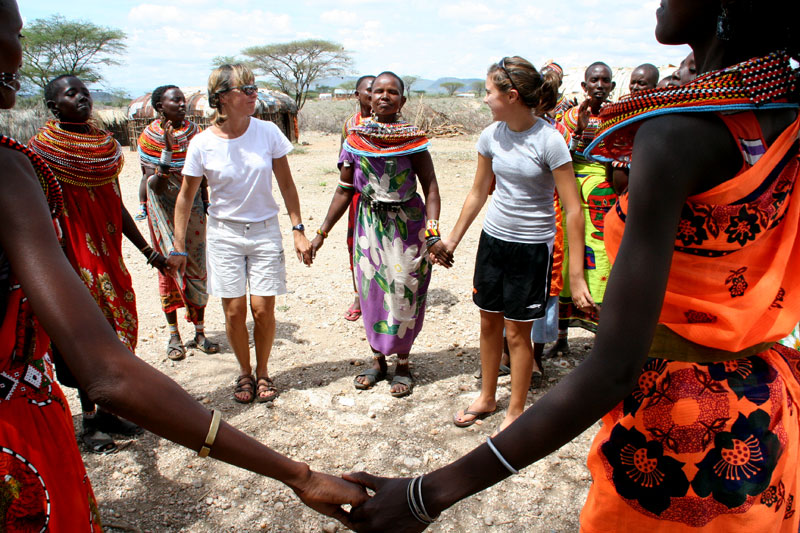[captionpix align=”left” theme=”elegant” width=”300″ imgsrc=”http://natoassociation.ca/wp-content/uploads/2014/01/Volontourism-picture.jpg ” captiontext=”Courtesy of Travelmuse”] A chance to see the world while helping others—that’s what some people are looking for in ‘voluntourism’: experiences that integrate travel and volunteer work that last around one and three weeks. The term was more or less non-existent pre-2007. Then it exploded. We’re now talking about a fast-growing multi-billion dollar industry, which is attracting business from mainly well-intentioned people—retirees, recent graduates and people undergoing work transitions—interested in giving back. After some quick googling, you will come across countless different organizations across the globe that can set you up with a volunteer project doing just about anything: educational initiatives, health campaigns, eco projects, wildlife preservation projects, building homes, working in orphanages, teaching English, or helping with post-disaster reconstruction. The options are endless. Unfortunately, what many fail to realize is that many of these projects are also convincingly marketed by commercial tour operators catering to travelers’ holiday demands, while making participants feel they would be really shaping the world as global citizens. Sometimes, these sorts of projects exist for all the wrong reasons. Of course, there are some projects and organizations that are more responsible, sustainable, and conscious of the local community than others. At the same time, however, we need to be more wary of those catch phrases—“the amazing experience!” and “the trip of a lifetime!” If you want to earnestly contribute to global development on your next journey you should take five main concerns into account: weak project planning, poor project monitoring, lack of skills, money shelling and the seemingly moral imperatives.
Weak Project Planning:
Sometimes we think we are helping people, but it’s not necessarily the case. In fact, an overwhelming proportion of volunteer projects don’t actually need volunteers; many can get local people to support a project. Although there may be lots of projects that would benefit from enthusiastic volunteers, the real issue lies when the real needs of a development project are not being addressed. Voluntourism projects, therefore, must have clear goals and metrics to ensure delivery is achievable and impact is sustainable. A commitment to project delivery and a need to work together with the members of the community are both crucial. Some things to ask yourself while looking for a project: How are the volunteering opportunities chosen? Are these real needs and can volunteers truly do something useful in as little as a week? Does the project provide orientation and training to both the foreign volunteers and the local recipients of the service to make sure both sides are fully prepared to get the most from the experience?
Poor Project Monitoring:
Many times, projects are created at whim, helping to give short-term volunteers a pat on the back. Some of these projects tend to take advantage of the communities and volunteers – taking away jobs from local communities, taking money they receive from donations for personal use, and even using children in orphanages. Believe it or not, there are organizations which go out of their way in search of orphans or children with real parents for that matter, purely for the purpose of leeching dollars from well-intentioned travellers. A case in point is the sordid orphanage tourism industry in Siem Reap, Cambodia. Next time you arrive in a tourist hotspot and are offered the chance to ‘assist’ at one of the local orphanages, be a little cynical.
Lack of Skills:
Just imagine yourself as a kid who, every couple of weeks, receives a new babysitter or teacher who may not have even gone through a background check! A common gripe with the voluntourism industry is a lack of skills which prevent some young, short-term voluntourists from being a good fit for most development project needs. Teaching English, for example, should not be left to 19 year old westerners, especially in countries where there are plenty of unemployed local English speakers. If, for some reason, we aren’t qualified to perform our volunteer roles, we might cause more harm than good. A question to keep in mind when looking out for a volunteer opportunity: Is there an application process or qualifications for volunteers?
Money Shelling:
Voluntourists typically spend a lot of money for flights, insurance, accommodation and food, visas and vaccinations as well as volunteer placement fees, which can be up to $700 a week, to head over to a rural community in a country they know nothing about in hopes of ‘making a difference’ for a week. This has become so mainstream that CheapTickets, a holiday website, recently started letting online customers book volunteer activities along with their vacations. Some argue this money could be better spent if it was donated directly to the project. For example it would last a lot longer used as a salary for a qualified local worker to take the place of the volunteer. However, for those who still want to volunteer and are not exclusively interested in funding, it is important to interrogate the operator concerning the amount of volunteer work funds that are going to the community itself, or even asking the organization such questions as how much of the project materials were bought from local businesses?
The Moral Imperative:
Many voluntourists come from North America and Europe, assuming that, because they come from wealthier places with higher standards of living, they can land into a new place without knowing much about the culture and ‘fix’ things. This perspective needs to change. The task of voluntourists should, in fact, be more about supporting individuals in their work. Many times, the people we visit have as much, if not more, to teach us as we have to teach them. With all this said, there is no immediate problem with people wanting to see more of the world through voluntourism. For young people in particular, this can help to increase international awareness and offer a really good cultural immersion experience, while building your resume, especially if you’re not quite sure about your career path. As well, older volontourists, upon return to their home countries, often become good advocates for the program and help to raise funds for the projects.
But, please, do your homework! Before embarking on a volontourist trip, find a credible organization to work with and give yourself enough time to truly commit to a project.
Plenty of terrible things really do happen out there in the world, even under the oft romanticized banners of volunteerism, so it’s worthwhile to take the extra time in advance to find out exactly what you’re getting yourself involved with. Volunteering projects should be locally-needed and culturally-sensitive while focusing less on the aspirations of the volunteers than the community they are trying to help. Don’t forget to pay attention to the fine details and remember to ask the right questions: Who are you working with? How are you working with them? Is it part of a larger plan? What was happening before you will arrive to do work? And what will happen after you leave? Equipped with proper and thorough research, you can make a difference and it can be unbelievably rewarding. Check out some of the websites supporting or reviewing sustainable volunteer work below:
VOFAIR Foundation – http://vofair.org/
Idealist- http://www.idealist.org/
Abroad Reviews- http://abroadreviews.com/
International Volunteer Programs Association- http://www.volunteerinternational.org/
Volunteer Abroad- http://www.goabroad.com/volunteer-abroad
Projects Abroad- http://www.projects-abroad.ca/voluntourism/
Volunteer Forever- http://www.volunteerforever.com/
Sierra Club- http://sierraclub.org/
Global Service Corps- http://globalservicecorps.org/
Earth Watch Institute- http://earthwatch.org/
Biosphere Expeditions- www.biosphere-expeditions.org
La Sabranenque- www.sabranenque.com
Cross-Cultural Solutions- www.crossculturalsolutions.org



